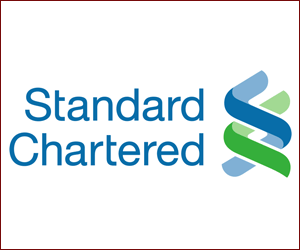Africa > Banking / Investment
Banking / Investment in Africa
-
Zimbabwe: ‘Foreign banks wont close over indigenisation laws’
ZIMBABWE, 2016/04/04 -
China to fulfil $60bn African investment pledge in spite of economic slowdown
CHINA, 2016/03/19 China’s economic slowdown will not affect its promise to invest $60 billion into development projects in African, said Beijing’s ambassador to Ethiopia. Li Yifan told Reuters News Agency that Africa stands to benefit as Chinese companies searched for investments while their own economy adjusts. China’s economy grew by 6.9 % in 2015, its slowest pace in a quarter of a century. I can share with you that the relevant government departments, development banks, and insurance companies in China are engaging … their African counterparts on how to make this grand plan come (to fruition). -
Tanzania: Govt Pledges Action As 91 Bank Customers Are Slain
TANZANIA, 2016/02/08 Over 3,000 cases of armed robbery targeting people coming from banks which led to 91 fatalities have been reported across the country in the last two years. The Deputy Minister for Home Affairs, Mr Hamad Masauni, told Parliament yesterday that from 2013 to 2015, a total of 3,036 incidents of armed robbery targeting such customers were recorded, and left 189 people injured. According to police records, Dar es Salaam is topping the inventory with 733 cases, 65 deaths and 43 injuries, followed by Mara Region which recorded 375 cases, 11 deaths and six injuries. Two regions, Unguja South and Pemba North, recorded no case of armed robbery during the period. -
IFC Supports Increased Access to Finance for Malawian Businesses With Collateral Registry
MALAWI, 2016/02/08 IFC, a member of the World Bank Group, said today it helped establish an electronic registry for movable collateral in Malawi, as part of an in general effort by the government of Malawi and the World Bank Group to promote access to finance for micro, small and medium-sized enterprises to foster inclusive economic increase. The collateral registry was officially launched in Lilongwe today, and will allow for the use of movable assets such as vehicles, machinery, livestock, inventory, and accounts receivables, as collateral for loans. This will increase the financing options for the small-scale business sector and individuals that lack traditional collateral such as land and buildings to access credit. -
CBN Extends BVN for Diaspora Bank Customers to June
NIGERIA, 2016/02/08 The Central Bank of Nigeria (CBN) has extended the bank verification number (BVN) enrollment for Nigerian bank customers in the Diaspora to June 30, 2016. The central bank stated this in a letter addressed to all commercial banks that was posted on its website on Wednesday. According to the apex bank, the decision to extend the BVN enrollment was taken next it observed through a survey, the low % of registeration of Nigerian bank customers in the diaspora. This, it attributed to lack of accessibility to registration centres and unavailability of registeration centres in some cities where Nigerian people is high. -
Namibia: Businesswoman Leads Development Bank Board
NAMIBIA, 2016/02/08 The Development Bank of Namibia (DBN) early this week announced the appointment of Tania Hangula as member and Chairperson of its Board of Directors. Tania Hangula, an entrepreneur, joins a line of businesswomen who before served on the Board of DBN in a quest to make notable contributions to economic transformation on a national scale. Hangula, with extensive government experience in the public sector, is currently the Executive Director for Business Development at Arandis Mining Services. She played a significant role in transforming the company from a family owned business to a mainstream company. She is as well a managing member of Umoja Trading Enterprises, which is a company with interest in the Namibian petroleum industry and other business sectors. -
The Steady Growth of Islamic Banking in Kenya
KENYA, 2016/02/08 While the political and social inter-religious relationships between Kenyans hog all the headlines - and not always for the right reasons - a quiet revolution is taking place in the banking and finance sector; the steady increase of Islamic banking in the country. And the majority noteworthy aspect of it is that the vast majority of the clientele is non-Muslim. At the same time as the concept of Islamic banking, additional correctly known as Sharia-compliant finance because its practical application must conform to the requirements of Islamic law, was initial introduced in Kenya about 10 years ago, it was taken up by only a handful of Muslim elites. Not any longer. -
Zimbabwe: MFIs Bank On Development Projects
ZIMBABWE, 2016/02/08 Micro-finance institutions' (MFIs) total loans amounted to US$173,3 million as of September 2015 with 53,73 % channelled towards development and productive sectors, an official has said. Zimbabwe Association of Micro-finance Institutions (Zamfi) executive director Godfrey Chitambo said a significant chunk of MFIs' loan books were focused on developmental projects, dismissing long-held notions that most MFIs' loans were fee-based and mainly for consumption. "The consolidated figure for the whole micro-finance sector was US$173,3 million as at 31 September. The Reserve Bank of Zimbabwe (RBZ) says we have put 53,73% of the total loans into developmental sector or US$93,12 million," Chitambo said. -
Sweeping reforms put Egypt back on the investment map
EGYPT, 2016/01/16 Reforms undertaken by President El Sisi’s government have restored Egypt’s position as a world-class investment destination Over the completed 18 months, President Abdel Fattah El Sisi has embarked on a bold reforms programme designed to revitalise the country’s economy. Presently, with over £130billion of new deals secured at the initial Egypt Economic Development Conference(EEDC), it seems that Mr El Sisi’s reforms are starting to take result. Inclunding reforming a notoriously bureaucratic and cumbersome economic system, the government has been doing all it can to attract foreign investors – acutely aware that it needs foreign capital to tackle its deficit and deficit. The new investment law presented a few months ago – just prior to the EEDC – goes a long way towards achieving this. -
The Bank of Ghana has disclosed, that the embattled Sunyani-based DKM Diamond Microfinance Ltd
GHANA, 2016/01/11 The Bank of Ghana has disclosed, that the embattled Sunyani-based DKM Diamond Microfinance Ltd, used customers’ deposits for excessive capital spending despite its low paid up capital of GH¢1 million, making it difficult to meet the depositors’ withdrawals on maturity. The capital spending exceeded the Bank of Ghana’s (BoG) specified threshold of not additional than 25 % of paid-up capital.
- Trending Articles
-
- AUSTRALIA: Australia election: Over 15 million voters likely to exercise their franchise
- CHINA: Forty-six Chinese-owned companies registered in Guinea-Bissau
- MALAWI: This $6 a month solar energy plan could power a million homes in Africa by 2017
- SOUTH AFRICA: South Africa’s Biggest Labor Group to Balance Pay With Job Security
- EUROPEAN UNION: EU meets without Britain for first time since Brexit vote
- ISRAEL: Israeli PM to embark on historic Africa visit boosting diplomatic, economic ties







